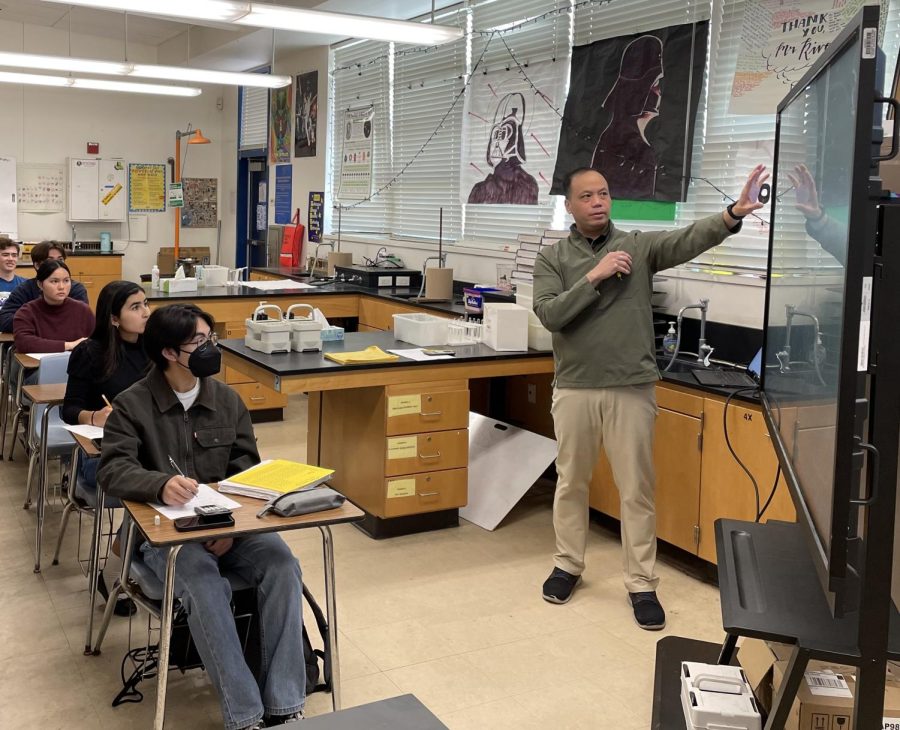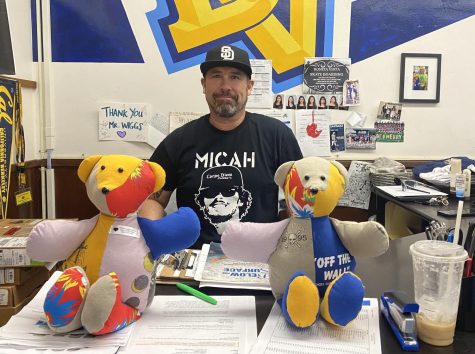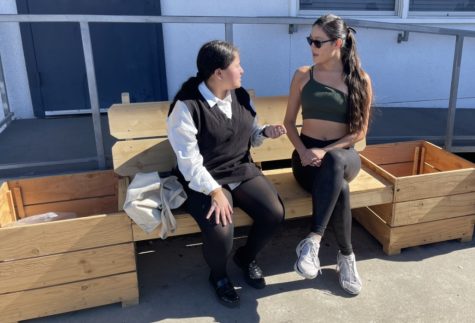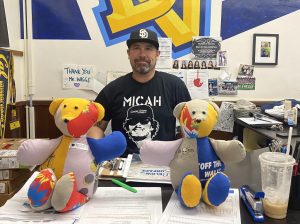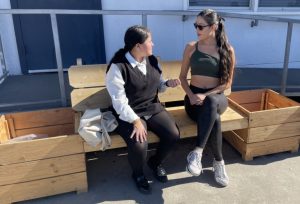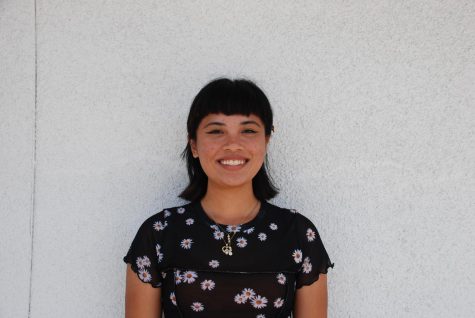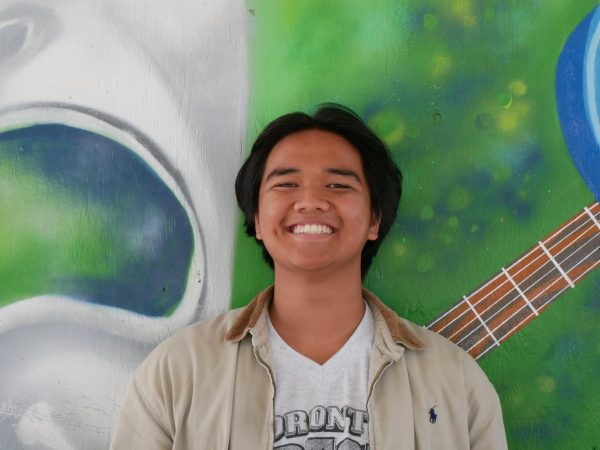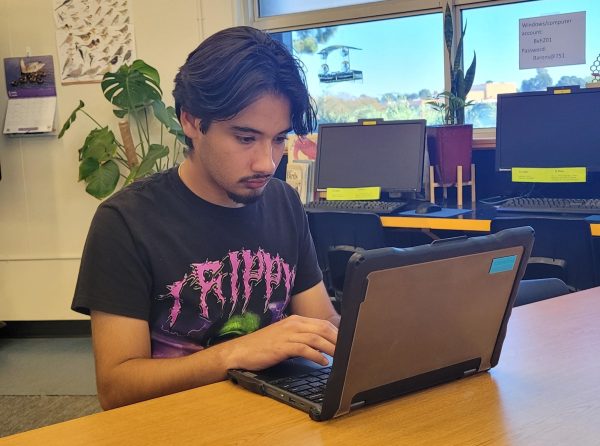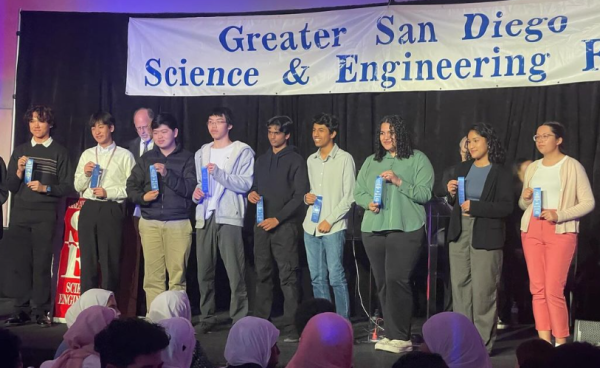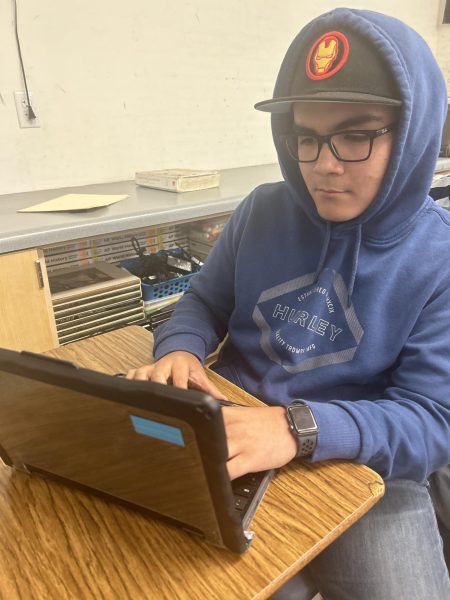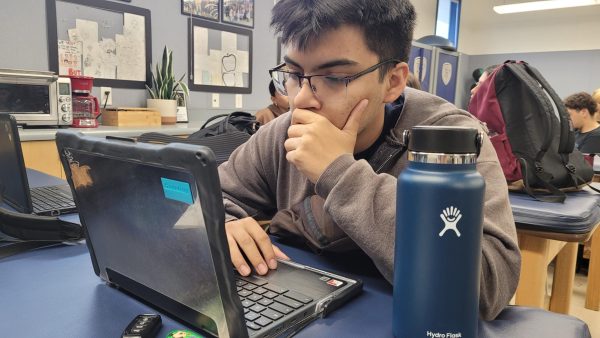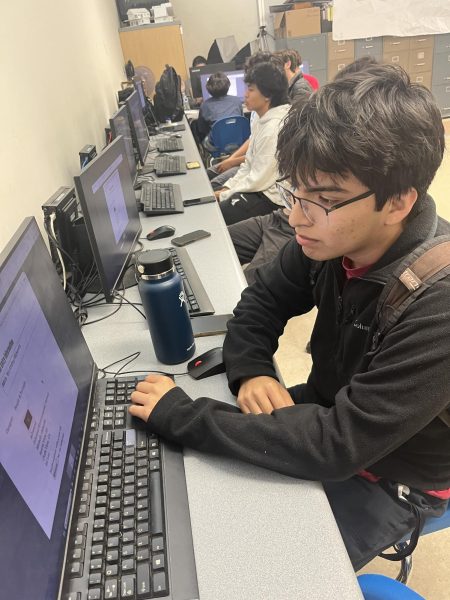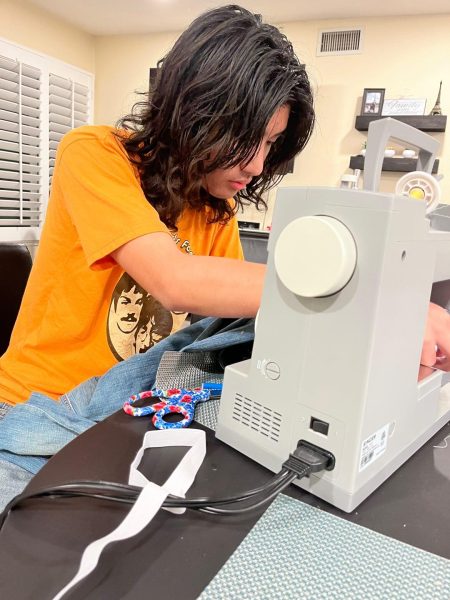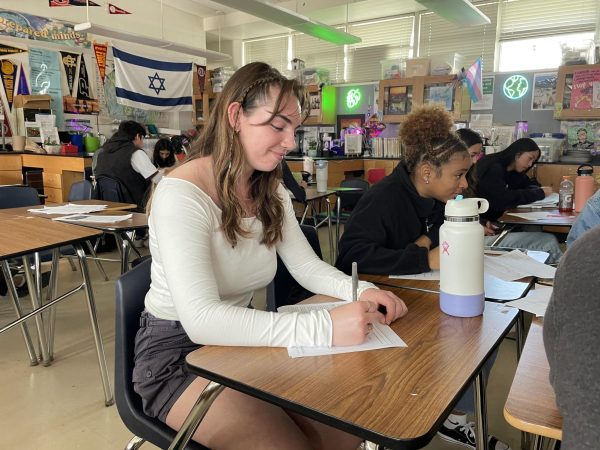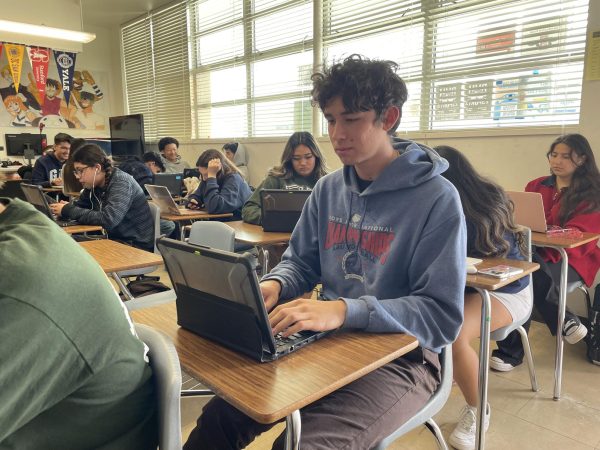College level science courses de-mystified
Why BVH sees class closures in college level science classes
Chemistry Honors, AP Chemistry, and IB Chemistry teacher Jeff Rivera teaching his fourth period AP/IB Chemistry classes. As a result of low student enrollment, there are no other periods with AP or IB Chemistry other than this one period.
February 3, 2023
“I have one combined section of International Baccalaureate (IB) and Advanced Placement (AP) Chemistry that totals 25 students. This is the first year that I’ve ever had to close a section at the semester change,” Honors Chemistry, AP Chemistry and IB Chemistry teacher Jeffery Rivera said.
On the first day of the second semester in the 2022-2023 school year, a section of AP Chemistry was closed. This is in line with the AP Biology course shut down and AP Physics C shut down at the beginning of the 2022-2023 school year. The common reason for these class closures is a limited budget and low enrollment rates.
“Understand that there are budget issues here. Small classes are okay but if the schedule has overflowed in other courses, then sometimes administration has no choice but to shut down a class,” Rivera explained. “When they closed the AP Biology section at the beginning of the year, those students were placed in classes they didn’t sign up for originally, which is a shame.”
As of now, there are 20 students enrolled in AP Chemistry and five students enrolled in IB Chemistry. On the other hand, the students who were initially enrolled in AP Biology are now enrolled in other classes.
“I had to find another class. I had a plan I wanted to follow, my whole plan was almost ruined because of AP Biology being taken out,” IB Higher Level (HL) Biology, Marine Biology student and sophomore Daniel Hernandez explained. I had to find another class. I had a plan I wanted to follow, my whole plan was almost ruined because of AP Biology being taken out. — IB Higher Level (HL) Biology, Marine Biology student and sophomore Daniel Hernandez
Hernandez switched into IB HL Biology after the AP Biology class closure. AP Biology and IB HL and Standard Level Biology teacher Dr. Michelle Mardahl explains that if five more students had signed up for AP Biology, the class would not have been closed. In addition to budgeting, Mardahl explains that having a greater selection of science classes for students to choose from also leads to classes being closed.
“We have a lot of science electives, [for example] a new forensics class [and ]Botany and Zoology. People who might’ve taken AP Biology were like ‘I could’ve taken forensics,” Mardahl said.
In the 2022-2023 school year, Bonita Vista High (BVH) began offering Botany and Zoology, and Biology Forensics as science electives. Low enrollment rates and a greater selection of science courses results in some science courses having small class sizes.
“We have, over the years, added higher level courses in Environmental Science and Computer Science. [As well as] elective sciences such as Marine Science, Botany and Forensics,” Rivera said. “With those additional offerings, enrollment in the ‘big three’ of bio, chem and physics has decreased.”
IB Coordinator Jared Phelps agrees that this is partly the cause for smaller class sizes. For example, there are 92 students in Biology Forensics and only 5 students in IB Chemistry.
“That number is not out of the ordinary. There was a year that we had 10 or 11 students doing IB Chemistry. But I feel like it’s not that five is the anomaly. It’s that 11 was the anomaly,” said Phelps.
Phelps and Rivera mentions that another reason for students’ decision to take college level science courses, is their confidence in the subject. These students recognize the unique educational opportunity offered to them.
“Students who take AP or IB Chemistry are taking it because they felt confident and enjoyed their Honors Chemistry experience. They see that a higher level experience will be invaluable for their college and career path, especially anything medically related,” Rivera said.
However, since the COVID-19 pandemic, that confidence has changed. Teachers have noticed student’s confidence in their work habits has faltered. Physics, Honors Physics and AP Physics 1 teacher Elan Hiller finds that even two years after distance learning, students are still adapting.
“2020 was horrible for teachers, students and horrible for everybody. Coming back last year, it wasn’t that much better,” Hiller said. “For half the year, people wore masks and you couldn’t even see who you were interacting with. You’d be surprised at how powerful that is just to know who you’re interacting with.”
Recovery from distance learning can play a role in students’ decision to take higher level science courses because students may not be confident in their ability to take on those classes. According to Hiller, AP Physics 1 in particular tackles abstract concepts; this year there is only one AP physics course open. Fortunately, Hiller has noticed that while students’ work ethics have changed, their progress is not stagnant.
“It took a while. This particular school year, although it’s not great, it definitely is an improvement in my classes. Is it the same as it was pre-pandemic? No. But it definitely is better than it was last year. And tons better than 2020,” Hiller said.
Similarly, the IB program in general is also seeing a recovery from the COVID-19 program. In the class of 2022 there were 50 IB Diploma candidates, while in the class of 2023 there are only 28 IB Diploma candidates. Post-pandemic effects are not unique to college level science classes.
“We’re losing students. Everybody’s figuring things out. And because the diploma program is something that you need to have decided on, way before a year ago, that has some of the burden of what we’re seeing now,” Phelps said.
Rivera explains that AP and IB classes will always have reputations of being “difficult” regardless of their Science, Technology, Engineering and Mathematics (STEM) classification. Although college level classes may be daunting to students, BVH science teachers are working to reduce that deterring factor.
“Any class can be daunting or boring if the teacher lets it. If the teacher talks for the entire class and then gives 2 hours of homework a student will be bored and overwhelmed at the same time,” Rivera said. “My most inspirational teachers, STEM, or otherwise, show a genuine enthusiasm and concern for their students.”
Hernandez’s genuine interest in Biology and aspirations to pursue this as a major motivate him to take on college level Biology classes. He finds that a lot of the difficult parts of his science class are misconceptions.
“It’s not actually that much work. You’re given so much help and time that it honestly has not been a problem to me throughout my first and now second semester. I’ve been doing fine in the class, [I haven’t] been staying up late and it’s been manageable with my other classes as well,” Hernandez said.
Knowing the reputation of college level classes, Phelps has changed his approach to IB recruitment. Instead of long, overwhelming presentations about what students need to do to receive the IB diploma, he now talks about the individual benefits of each IB class.
“The way that I’ve been approaching that conversation and the way I see our IB program, is every single IB course that we offer has value,” Phelps said. “I’m overjoyed if students do one or two of them. [When] I get to the end of my presentation [I say] ‘If you’ve liked everything I’ve talked about, let’s talk about the whole diploma program.’”
In contrast to Phelps, Hiller uses personal experience to make his physics classes more accessible to students. Having taken AP physics when he was an 11th grader, he understands the position his students are in. He explains that physics is like a roller coaster, sometimes concepts are easy and other times it can be rough. At the end of the year, he encourages his students to reflect on their experiences.
“That’s one of the things I enjoy doing during the course of the year is de-mystifying the concept of how hard a physics class really can be,” Hiller said. “It’s nice to look at it right before we end the school year and have that reflection period. ‘Do you think this class was as hard as you thought it was when you stepped in on day one?’ That to me is really powerful every single year.”

